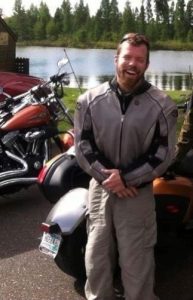 Although October is over, the Minnesota Council on Disability will celebrate National Disability Employment Awareness Month all year round! In celebration, we’ve put the spotlight on Minnesotans with disabilities seeking employment – without the inspirational spin.
Although October is over, the Minnesota Council on Disability will celebrate National Disability Employment Awareness Month all year round! In celebration, we’ve put the spotlight on Minnesotans with disabilities seeking employment – without the inspirational spin.
Meet Nick Wilkie. Nick is a fun-loving person who is passionate about building relationships while enjoying a good laugh. He talks about how he got started in his career and why following your passion is the key to success.
Tell us about yourself.
My name is Nick Wilkie. I live in St Paul with my wife and two dogs. I have Cerebral Palsy (CP), a spastic condition that affects the right side of my brain more than the left. Thankfully, I’m right-handed! I use a cane as a mobility device most of the time, but if I need to go off-roading, I’ve got forearm crutches.
I have been working at the Metropolitan Center for Independent Living (MCIL) as an independent living coordinator for 15 years. I’m passionate about helping people get to where they want to go, with an emphasis on helping them remove barriers while promoting choices.
Did people expect you to go to work or college?
Yes, there was an expectation that I would go to college and then get a Master’s degree. I believe because I heard those expectations growing up that I internalized them and that helped push me.
How did you get started in your career?
After I graduated, there was about a six-month period where I wasn’t getting opportunities. There may have been a small voice in the back of my head that said, “You’re not getting opportunities because of CP.” It was tough. I struggled with the feeling of being overqualified but untested.
What can we do to give people an honest “in” and begin to have conversations about how everybody deserves to have an opportunity to work? It doesn’t need to be this “special thing.”
I wanted to be a professional speaker, and then I realized that I needed health benefits. I ended up going through Vocational Rehabilitation Services, and ironically, my Employment Specialist said to me one day, “Nick, you could do what I do!” Turns out he was right!
As an Employment Specialist, my job was to carve out positions for people with disabilities by building relationships with employers, helping with applications, and preparing for interviews. I began to ask myself: What can we do to give people an honest “in” and begin to have conversations about how everybody deserves to have an opportunity to work? It doesn’t need to be this “special thing.”
When I transitioned over to MCIL, I was excited to see people with disabilities push boundaries and seek out the things they want in life.
You can do what you want. It could be a big thing; it could be a small thing but having that and the willingness to pursue it is the way that everyone can live their lives!
What have you learned in your role as an Independent Living Coordinator?
Employment is part of independent living, but it’s not all of independent living! Some folks might need a little push, and then once they have success, their confidence builds. I’ve learned that sometimes the hardest person to convince is that individual with a disability that has not been encouraged. Or, if they’ve been told that they can’t, it can be more challenging. Everyone will become disabled at some point in their lives. It’s OK to need help.
How has the pandemic changed your work?
One of the big things that drives me is my desire to build human connections with others. It has been challenging for me in pandemic because I’m not in classrooms talking about disability awareness. I was a guy that had a desk but was hardly ever there. Now, I’m at my desk all the time, interacting with people virtually.
Do you have advice for people with disabilities having a hard time finding jobs?
Hang in there! It’s important to discover what drives you. Remember that you get to decide how fast or slow you want to move. If you can find something that fulfills a passion you have, you’re going to do well!
Employment is part of independent living, but it’s not all of independent living!
Another piece of advice is talking with other people with disabilities and beginning that dialogue because somebody out there is doing it!
What do employees with disabilities bring to the workforce?
Drive! If you give somebody with a disability opportunity to work, they are going to be a good employee because they have strived to get that opportunity. People with disabilities want to work and live their lives just like anyone else.
One of my favorite parts about my job is seeing the success stories, but it’s not about “inspiration”; it’s about how people want to live! If we can be outward and open about our situation, we can build relationships to provide a deeper level of understanding of one another – disability or not.